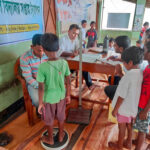Tag: Payal Seth

Multisectoral Convergence of Food, Nutrition and Sanitation Programs for Child Health: Evidence From Country-Level Programs in India
Abstract This paper underscores the critical role of multisectoral convergence in enhancing child health, particularly in addressing anemia, a micronutrient deficiency linked to both diet and sanitation. We explore how the integration of nationwide food and nutrition programs with sanitation initiatives impacts anemia in Indian...

Interministerial Coordination Can Boost India’s Fight Against Anemia
A new Tata-Cornell Institute for Agriculture and Nutrition (TCI) study on the impact of government nutrition and sanitation programs on anemia in India underscores the importance of a systematic approach that leverages all available pathways to reducing the disease.
In…

Information Is Key to Ending Open Defecation
This policy brief presents the results of a study of the impact of toilet subsidies and behavior change communications on the practice of open defecation in rural India. TCI researchers conducted a cluster randomized trial of villages in Uttar Pradesh, providing one group of villages...

Information Is Key to Making India Open-Defecation-Free
Solving a problem like open defecation is not as simple as installing toilets. In 2019, after decades of work, India scored a major developmental victory by providing 600 million people with access to toilets. But while the toilets were built,…

Addressing Information and Credit Barriers to Making India Open Defecation Free and Improving Child Health: Evidence from a Cluster Randomized Trial in Rural India
Abstract Read a policy brief based on this study. Background Open defecation (OD) remains a significant public health challenge in India, contributing to adverse child health outcomes. Eliminating OD and improving child health necessitates both universal access and adoption of toilets. Despite the success of...

These Are the Keys to Promoting Artificial Insemination for Livestock
With the world’s population growing and dietary preferences changing, rising demand for animal-based food products like milk presents an opportunity for farmers in the developing world. Artificial insemination can help these farmers improve their productivity and increase their incomes, so…

Understanding the Determinants of Farmers’ Adoption of Artificial Insemination in Livestock
Abstract Read a policy brief based on this study. The adoption of artificial insemination (AI) in livestock is a crucial factor in enhancing breeding efficiency, livestock productivity, and income opportunities for farmers. However, the adoption of AI among farmers can vary significantly, influenced by a...

Women’s Empowerment and Intra-Household Diet Diversity Across the Urban Continuum: Evidence from India’s DHS
Abstract Read a policy brief based on this study. Women’s empowerment has been associated with improved nutritional outcomes in various settings. However, the gains from empowerment do not necessarily accrue to different members of the same household in the same manner. Furthermore, the relationship between...

Empowerment Programs Can Improve Nutrition of Women Left Behind by India’s Urban Transformation
New research from the Tata-Cornell Institute for Agriculture and Nutrition (TCI) reveals that Indian efforts to improve household nutrition through women’s empowerment could have a greater impact with a more targeted approach that takes into account different levels of urbanization. …

Improving Livelihoods Through Enhanced Goat Breeding
Goat rearing holds significant promise for smallholder farmers in India, offering resilience and income generation even during crop failure. However, reliance on natural breeding practices limits productivity due to issues like inbreeding and disease transmission. Artificial insemination presents a viable…

